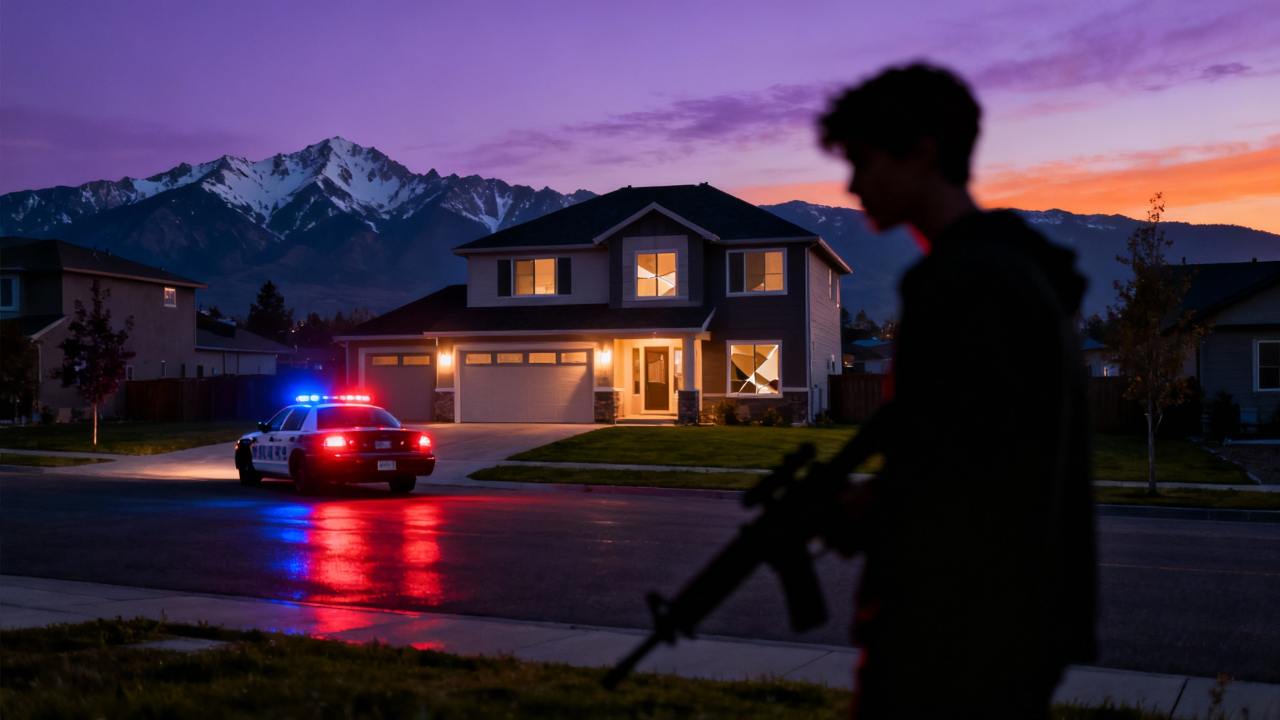A Family That Knew First

The story of Tyler Robinson, the 22‑year‑old charged in the assassination of conservative activist Charlie Kirk, is inseparable from the family that eventually turned him in. His father recognized him instantly in FBI surveillance images:
The build, the face, even the familiar ballcap. When confronted, Tyler confessed. A youth pastor close to the family—one who also serves as a federal court security officer—was contacted, and he, along with Robinson’s parents, helped deliver their son into custody.
The moment of realization reportedly broke his mother. Neighbors say she wept in the driveway as police cars clustered around their modest home in Washington, Utah. Robinson’s family had long been known locally for their strong embrace of Utah’s tight‑knit gun culture. His father, regularly seen around town in a shirt emblazoned with a black American flag, projected the militancy common in that subculture: proud of the Second Amendment, wary of federal power, and prone to a kind of grim patriotism. That backdrop makes the fact that his family chose to cooperate with authorities all the more striking. It was loyalty to their country—and to decency—that overrode loyalty to their son.
A Promising Student Turned Bitter
Robinson wasn’t a dropout or an outcast in the textbook sense. He had earned early college credits at Utah Tech University while still in high school, secured a scholarship to Utah State, and eventually entered an electrical apprenticeship program at Dixie Technical College. Teachers described him as bright, respectful, even reserved.
But family members told investigators that in recent years he had become “more political”—a vague but ominous shift. He wasn’t affiliated with any political party, didn’t vote in the last two elections, and kept no bumper stickers or yard signs. His politics lived online. Discord messages, his roommate later turned over, suggested he had retrieved a rifle from a “drop point” and engraved ammunition with warped jokes mixing political contempt with meme‑culture insincerity—phrases like, “Hey fascist! Catch!” and “If you read this, you are gay LMAO.”
This cocktail of nihilism and ideology is not new but it is powerful: a deep soup of trolling language, revolutionary cosplay, and genuine anger at public figures like Kirk.
A Carefully Staged Attack
On the morning of September 10, Robinson drove to Utah Valley University in a gray Dodge Challenger, arriving hours before Charlie Kirk was to take the stage. Surveillance caught him wearing a maroon t‑shirt, light shorts, and a cap. He carried a Mauser bolt‑action rifle, an odd choice in America’s glut of high‑capacity weapons, but one that signals deliberation: slower, precision fire, more echo of a sniper than mass shooter.
When Kirk stepped onto the open‑air stage that afternoon, Robinson fired from a rooftop. Within seconds, America’s most polarizing conservative youth organizer was dead.
Why He May Have Done It
Authorities are cautious about naming a motive, yet all available shards of evidence point to a stew of discontent rather than a single cause.
- Political hostility: Relatives recalled him openly saying he “didn’t like” Kirk or his views.
- Gun culture immersion: His upbringing surrounded him with firearms and an ethic of self‑reliance and “patriotic resistance.” That sentiment, when inverted, can turn violent.
- Online radicalization: The engraved bullets, the Discord chatter, the memes etched onto steel—these are not the markers of a coherent ideology, but of someone steeped in internet subcultures where irony and hate blur seamlessly.
What makes this case chilling is that nothing in Robinson’s earlier social footprint shouted danger. No violent history. No constant ranting on Facebook or Twitter. Instead, the signs were quieter, more insidious—dinner‑table comments, edgy online jokes, a growing fixation on a single public figure.
A Family’s Tragic Intervention
If not for his father recognizing him—and making the agonizing decision to turn him in—Robinson might have disappeared longer into the desert hills of Utah. Instead, it was the very gun‑loving, conservative‑leaning household that raised him that ultimately drew a line.
That contradiction is worth sitting with. A family shaped by gun culture ended up betraying its own son to prevent further political violence. Their action almost certainly saved more lives, and in doing so separated the idea of owning weapons as cultural identity from deploying them as political tools.
The Larger Question
Political assassinations in America have a way of becoming turning points. Utah’s governor called this one a “watershed.” The deeper suspicion is that Robinson himself was not unique—he was another young man caught in the crosscurrent of meme toxicity, grievance politics, and firearm accessibility.
If one quiet 22‑year‑old from southern Utah could improvise a rooftop attack on a national conservative icon, what does that suggest about how many others are out there, simmering online, waiting for their own moment of notoriety?
That may be the hardest outcome of this tragedy: not just the loss of Kirk, but the fear that Robinson’s trajectory is a template rather than an outlier.
